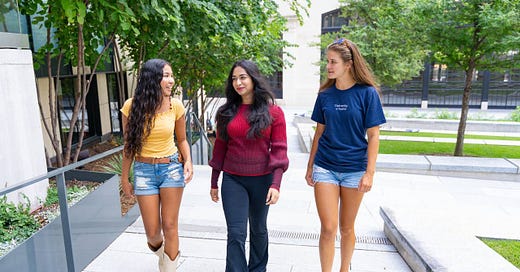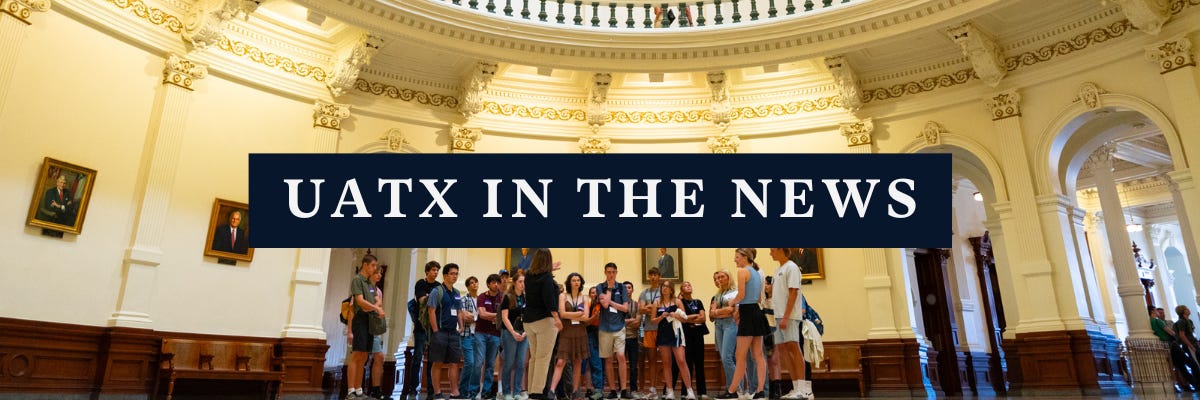What to Remember When Starting a New Chapter
Advice on finding balance. PLUS: Provost Jacob Howland and Founding Trustee Sir Niall Ferguson explain what all freshmen should read.
Greetings from 6th and Congress! We are six days from move-in. As I write this, our students are making their final preparations to begin their freshman year at the University of Austin.
Many of our staff and faculty have spent years designing programs to help these exceptional young people integrate their individual needs and gifts into a new community.
“Our biggest concern is ensuring our students find a genuine home,” said Benjamin Crocker, UATX Associate Vice President of Students and Community.
“We will encourage our students to be individuals,” he said. “Indeed, their distinctiveness is partly why we chose them to help found a university. At the same time, we believe that young people need the steadying influence of authority and wisdom, family and community.”
“Our culture at UATX will champion respect for our elders and the great minds who came before us,” he said. “Making a home at UATX requires recognizing obligation alongside opportunity.”
This week, we're introducing a University of Austin employee uniquely placed to help students find that balance.
Becca Schwinger, UATX Community Manager, designs and implements university programs with a focus on the parents of prospective and enrolled students. She worked in advancement at Rice University for nine years before raising her three children. Now, she draws on her personal and professional experience to help students and their families adapt to college life.
We asked Becca to share some advice on starting anew. Here’s what she said:
Every kid is different. As a mother, I know that the words that encourage one child will not necessarily hold the same meaning for another, and college life can be a demonstration of extremes. One student will be naturally inclined to study and achieve and become almost myopic in those pursuits. Another will be more inclined to enjoy the social aspects of university life and struggle to crack a book or even find the library.
Here’s my advice to all, regardless of inclination: find your balance, and build a broad community.
We live in a society that tells people to invest in themselves and that college is all about them, their pursuits, and their “moment.” That’s partially true, but in my experience, students who are encouraged to think of their university days in this way often end up disappointed.
When all you do is focus on yourself, that is all you are left with.
Instead, I encourage students to enter college intending to invest in others. Work hard at your studies by using your time and energy to know your professors and fully participate in the exercises of learning. But balance academics with time building a community of friends and colleagues. Invest in people and conversations. Enjoy time spent over a meal or going on a run. Cherish what each person you encounter gives to you through every interaction. Those investments will remain with you and teach you more than you could ever learn in a book.
College is about becoming more deeply engaged in society and understanding how your interests, talents, and convictions can contribute to its well-being. Finding those connections is intensely gratifying and will transform how you understand yourself.
By learning to connect your greatest gifts and passions with the world’s greatest needs, you have the potential to transform the world.
And don’t forget to call home!
Speaking of transforming the world, today we bring you a special announcement from The Mill Institute at UATX.
The Mill Institute, a UATX affiliate, promotes an open and rigorous exchange of ideas in high school and university communities and classrooms. Its programs and resources create a foundation for open dialogue, helping students challenge the belief that sensitive topics like identity, justice, or equality have obvious or easy answers.
Are you a parent or educator looking for resources that promote open inquiry and viewpoint diversity? The Mill Institute is excited to announce that its 2024 Viewpoint Diversity Challenge is now available to download for free.
The Viewpoint Diversity Challenge is a one-hour resource that supports high school students in having conversations about sensitive political topics in a way that lets all voices be heard. During the challenge, students engage with current news stories while learning tools for exploring the underlying values, assumptions, and beliefs of opposing viewpoints. Students set personal goals and ground rules for the classroom to help establish a climate of open inquiry for the academic year. Over 130 classrooms participated in last fall’s challenge. Of educators surveyed, 100% said they would use the lesson again, and 90% said it made discussing issues in class easier.
The session includes:
A student discussion about why it can be so difficult to talk about important social and political issues as a class
The establishment of clear discussion guidelines to foster open inquiry
An exploration of echo chambers and how they are created and sustained by “settled thinking”
An opportunity to read and analyze articles sharing multiple perspectives about topics like the recent campus protest movement
As John Stuart Mill writes, if ideas are not “frequently, and fearlessly, discussed,” they become “dead dogmas” rather than “living truths.”
Access and share the free Viewpoint Diversity Challenge resource here.
Jacob Howland and Niall Ferguson in The Atlantic, Aug. 24, 2024:
Liberal education requires that students, like rowers, face backward in order to move forward. If they are to become active and reflective individuals, they must learn to regard the past not merely as the crime scene of bygone ages, but as the record of human possibilities—an always unfinished tapestry of admirable and shameful lives, noble and base deeds. …
A real general education begins with the development of the West from its archaic beginnings to late modernity. In exploring the tensions between reason and revelation, freedom and authority, intuition and scientific demonstration, students need to confront what the philosopher Immanuel Kant identified as the four most fundamental questions of human existence: What can I know? What should I do? What can I hope for? What is man? …
Any edifice that rests on the shifting sands of contemporary academic fashion is bound sooner or later to fall. The university of the future will, paradoxically, need to offer its students an education with deeper historical roots.
UATX profiled in The Times of Israel, Aug. 24, 2024:
Those behind UATX are aiming to counter what Pano Kanelos described as the gradual but forceful introduction of “ideological protocols” at universities, which have ended up “distorting knowledge.”
“Universities have historically been places where we do our own thinking, places we dedicate to thinking, to knowledge creation, to the transmission of knowledge, to the preservation of knowledge,” he told The Times of Israel in an on-site interview this spring. At traditional institutions, “all the evidence points to a kind of retreat from that commitment” and at “many, if not most, universities and especially… elite universities… the pursuit of knowledge is maybe not always prioritized.”
Jacob Howland on The Brian Kilmeade Show, Fox News, Aug. 23, 2024.
Provost Howland: At UATX, we aim to strike a balance between the grateful reception of the wisdom of our ancestors and looking forward to improving the world.
We’re seeking extraordinary individuals to join us in building the University of Austin. View all jobs.
What would you like to see Inside UATX? We want to hear from you. Email us at media@uaustin.org.

See you next Monday!
Maggie Kelly is the editor of Inside UATX. Follow her on X @margaretbkelly.







